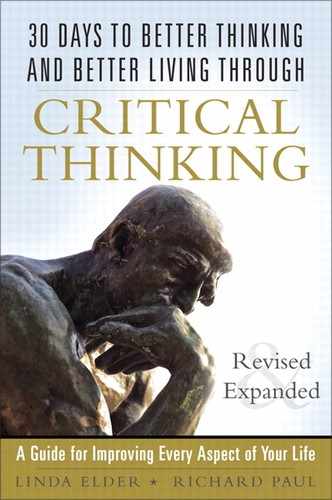Day Twenty-Nine. Educate Yourself
Although many people complete many years of school, including undergraduate and graduate studies, few people are truly educated in the highest sense of the term. Why? It is because few people have learned how to learn meaningful ideas. They are not learners for life. Instead, they form belief systems and then defend their beliefs for the rest of their lives. There is little development in their views. They do not expand the horizons of their minds. To the extent that they do develop, they tend to do so in certain narrow or technical ways (such as learning skills for succeeding on the job, or learning skills needed for a hobby). They lack the intellectual skills and traits unique to an educated person.
“A human being is not, in any proper sense, a human being till he is educated.”
—H. Mann
In 1852, John Henry Newman gave a series of lectures on education,15 which were later compiled and published in the book The Idea of a University. In it, he describes the impact a well-designed education has on the mind of the learner:
15. Newman, J. New York: Longman’s, Green and Co, 1852; 1912.
“...the intellect, which has been disciplined to the perfection of its powers, which knows and thinks while it knows, which has learned to leaven the dense mass of facts and events with the elastic force of reason, such an intellect cannot be partial, cannot be exclusive, cannot be impetuous, cannot be at a loss, cannot but be patient, collected, and majestically calm, because it discerns the end in every beginning, the origin in every end...because it ever knows where it stands, and how its path lies from one point to another” (p. 138).
In this book, we have introduced a number of the skills and traits of the educated mind. We have laid out an array of places to begin. To learn at a deep level, you need to take an active approach to your learning, realizing that education occurs throughout your lifetime, not just during your school years, and then only through committed practice. You need to understand the process of lifelong learning and explicitly choose to engage in it.
Place the cultivation of your mind...
...at the heart of your personal values. Begin to develop a plan for lifelong self-development. Study your own behavior. Lay bare contradictions and inconsistencies. Study the behavior of others. Notice how often ignorance is broadcast as knowledge. Notice how often what is arbitrary is presented as universal. See through to the shallowness of celebrity and status. See through pomp and ceremony. Vow to learn something important every day by reading important books and articles. Recognize that deep learning of new ideas, continually integrated with ideas already internalized, is the key to the educated mind, and the key to living a rational life. Reflect on ideas of significance. Identify opportunities to be with people who are seeking to improve their minds. Create a library, which includes works by the world’s best thinkers past and present (including dissenting thinkers). Make it your home.
Strategies for self-education
• Read widely. Read something every day that opens your mind to new and important ideas. Focus especially on great literature and the works of great thinkers. Go beyond current-day writings. Read the ideas of great dissenters throughout history. For suggested readings, see the section near the end of this book titled “Reading Backwards.”
• Become your own historian, sociologist, and economist. You cannot be educated without a broad historical, sociological, and economic perspective. Understanding what is actually happening in the world requires studying human behavior over time, examining patterns and their implications. It means reading alternative historical accounts that help offset the sociocentric accounts that dominate the worldview of most people the world over. It involves becoming aware of the arbitrary nature of (most) social norms and taboos. It requires distinguishing universal ethical principles from variable social rules and taboos. By gaining a broadly grounded worldview, you will be better able to critique international news and irrational social practices. You will increasingly become your own person.
• Acquire the principles of critical thinking, tools at the heart of intellectual discipline and development. For additional resources, visit the Foundation for Critical Thinking (www.criticalthinking.org).
